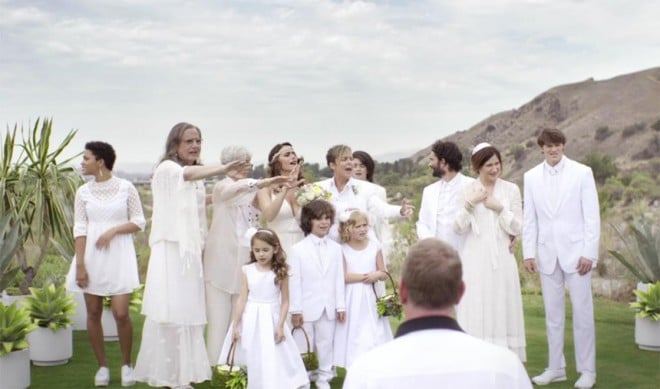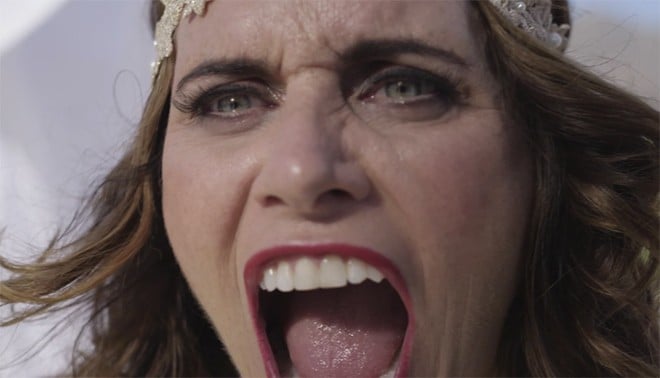Transparent’s New Season Premiere Finally Gives Gay People The Absurd Wedding We Deserve
Being truly equal means showing not only a shiny, campaign-driven view of marriage, it means making room to criticise the institution and admit its failings.

Spoilers for the first episode of Transparent’s second season.
–
As Australia’s campaign for marriage equality enters its second decade, Jill Soloway‘s Transparent has served up a season premiere chronicling perhaps the most realistic lesbian wedding in recent TV history: an explosion of anxiety, ex-girlfriends, homophobic relatives and ridiculous outfits. I know my supposed job as a lesbian is to constantly rally for marriage equality, but despite being in favour of equality in principle, I’m actually quite the wedding grinch. As the episode played out like a campaign ad against all marriage, I watched with eager delight.
Having concluded the show’s first season with a funeral, welcoming viewers back with a wedding is a neat conceit. The opening scene offers the perfect symbol for the modern wedding industrial complex: the photoshoot. Forced, awkward and unable to come together as a family to pose, the characters argue with the photographer and each other, preoccupied with how they look, who should stand where and the fact they “paid for more than one photograph”. It’s not new to point out how strange wedding photoshoots are, but I’m going to do it again because sweet Jesus they are ridiculous. Packed with whimsy, novelty and vintage cars, these days wedding photography is less about capturing your special day and more about fulfilling some childhood dream of becoming a supermodel.
On Transparent, The Pfeffermans’ presumably unsuccessful photoshoot concludes abruptly when the photographer rudely refers to the bride’s transgender parent, Maura, as “sir”. The photoshoot with Tammy’s family (the other bride), includes two exes’ muttering hilariously about “sister wives” and “lesbian Pokemon” and concludes the show’s intro with the group shouting that now famous phrase: “#LOVEWINS.”
Love wins, hey? We work out pretty quickly that it doesn’t.
In most mainstream TV shows, the inclusion of LGBT characters is generally considered a celebration of diversity — especially when those characters are afforded the legal benefits of marriage (a new development in the US, where Transparent is both made and set). From Modern Family to The Fosters, the gay wedding is generally shot in heartwarming soft focus, with heavy doses of emotion.

Exhibit A
This episode, however, reads more like a Halloween special.
We see the wedding through bride Sarah’s eyes as she descends into panic, witnessing the grand event as disjointed snapshots of aggressive cake cutting and clownish grins. Her increasing distress allows us to see this time-honoured ceremony as the bizarre performance it is, complete with an audible word cloud of platitudes in place of the full vows: “commitment — entire universes — such love — more than — what it means — support — in the dark — witnessing each other’s light”. In denying the audience the conventional emotion of the moment, Transparent opens up a space where it can criticise marriage and, in doing so, challenge many of the arguments my community use to advocate for marriage equality.
It’s about family? In Transparent we’re offered the estranged homophobic, transphobic aunt who’s only invited as a seat-filler for Sarah’s side of the ceremony. She cruelly comments on Maura’s appearance, attacks the family for abandoning their relatives and then discourages Maura from visiting their mother at all in fear of her transition causing distress.
It’s about committing to one person for life? This is neither Sarah nor Tammy’s first rodeo as we are reminded when Sarah’s kids ask if there dad is coming to the wedding. Meanwhile, the only couples left kissing at the end of the night are the newly-pregnant but unwed Josh and Raquel, and Maura and Shelly who divorced years ago.
It’s about tradition? The absurdity of ritual is highlighted with marvellous creative choices, such as dressing the entire wedding party and guests in virginal white, or the grotesquely made-up wedding singer performing an intense rendition of Israeli folk song, ‘Hava Nagila’. “Let us rejoice!” she sings as one of the brides weeps on the toilet floor.
As the MC announces the “traditional father and daughter dance,” Sarah looks to her transgender parent perplexed at how such a tradition even applies to her. This moment is particularly poignant and critical when you consider how consistently the marriage equality movement and mainstream gay and lesbian advocacy ignore transgender rights, or silence their role in history, in the pursuit of conservative acceptance.
Gay men and lesbians were getting committed on TV long before we all rainbowed our profile pics to celebrate marriage equality. We had Carol and Susan on Friends in 1996, then more recent romances like Greys Anatomy’s #Calzona and Glee’s #Klaine. The gay wedding isn’t new for TV; indeed, it’s almost a rite of passage for a progressive showrunner. For those so inclined, the internet is drowning in listicles of TV’s best gay weddings. But complex portrayals of LGBT activism or the marriage equality movement are a little more rare, let alone blatant challenges to the value of the institution.
Shunning contemporary television’s tendency to demonstrate its support for the LGBT community with a schmaltzy, romantic homo love fest, Soloway’s efforts see Sarah and Tammy disconnected from each other and, ultimately, not actually legally wed. As Sarah bemoans the fact she is “stuck with [Tammy] for life”, the rabbi lets her know that she isn’t married yet because the license hasn’t been delivered to City Hall.
“What is a wedding, then?” asks Ali, the sister of the bride. “It’s a ritual,” says Raquel. “It’s a pageant. It’s like a very expensive play.”
Truer words were never spoken.
While I agree that any efforts to support equality have value — the Australian government are conducting a cruel and absurd pantomime prolonging the inevitable — seeking entry into the marriage act is not really about enduring love but rather permission to participate in a popular ritual. If the LGBT community’s wish to be included in this cultural norm, we need to accept that we get the good (equality) as well as the bad (rude family members, anxiety, expensive ceremonies, conservative values, divorce). Being truly equal means showing not only a shiny, campaign-driven view of marriage, it means making room to criticise the institution and admit its failings. Aping heteronormative relationship structures — ones that aren’t really working, if the divorce rate is to be considered — leaves us all with little hope for love, but a lot of scope for drama and comedy. I can’t wait for the rest of the season.
–
Transparent‘s second season premiere is streaming now on Stan. The rest of the season will drop on December 12.
–
Maeve Marsden is a freelance writer, director, producer and performer, and the creator of Sydney cabaret act, Lady Sings it Better. She tweets from @maevegobash.
–

